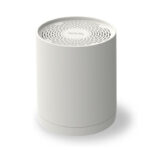Breathing clean air extends life: we could live up to 6 years longer

More than 200,000 premature deaths can be prevented, according to the EEA

We could on average live up to 6 years longer if only we breathed clean air.
Many harmful substances in gaseous form enter our respiratory system unbeknownst to us and can affect our daily well-being. Among the most dangerous pollutants that are present at high concentrations is particulate matter, an airborne dust present in both outdoor and indoor air, produced by sources as diverse as soot, combustion processes, and natural sources.
The European Environment Agency’s (EEA) briefing note “Health impacts of air pollution in Europe ” presents updated estimates of how key pollutants including fine particulate matter affected the health of European citizens in 2019. The briefing note assesses the potential benefits of improving air quality against the new guideline values recommended by the World Health Organization (WHO). It also measures progress toward the EU’s Zero Pollution Action Plan to reduce the number of premature deaths from exposure to fine particulate matter by more than 55 percent by 2030.
According to the most recent EEA estimates, about 400,000 people died prematurely due to exposure to fine particulate pollution in the EU in 2019. At least 58 percent of these deaths could have been avoided if all EU member states had reached the new guideline level of 5 µg/m3.
The impact at the economic level

Although air pollution is often associated with peaks and troughs, long-term exposure to lower doses poses an even greater threat to human health and nature.
The American study

A team of environmental engineers from the University of Texas (Austin) explains this in a report published with colleagues from other U.S. research centers in “Environmental Science & Technology.”
In the crosshairs are the effects of fine dust, which can penetrate deep into the lungs and is associated with numerous diseases, respiratory and otherwise. “We are surprised to have found the importance of clean air not only in the most polluted parts of the world, but also in relatively cleaner environments,” the authors conclude.
Reducing air pollution contributes to the fight against climate change

Carbon dioxide may be the main cause of global warming and climate change, but it is not the only one. Many other compounds in gaseous or particulate form have an influence on the amount of solar energy the Earth retains.
Particulate matter is another pollutant that affects both climate change and air quality and, depending on its composition, can warm or cool the global or local climate. There are some components of fine particulate matter that are able to absorb solar and infrared radiation in the atmosphere and thus induce warming.
To increase cohesion among actions taken at local, national, European and global levels, the European Commission brought together various stakeholders from across Europe at the Clean Air Forum, held in November in Paris and focused on improving air quality. The Forum also highlighted technological innovations and opportunities related to clean air actions.







